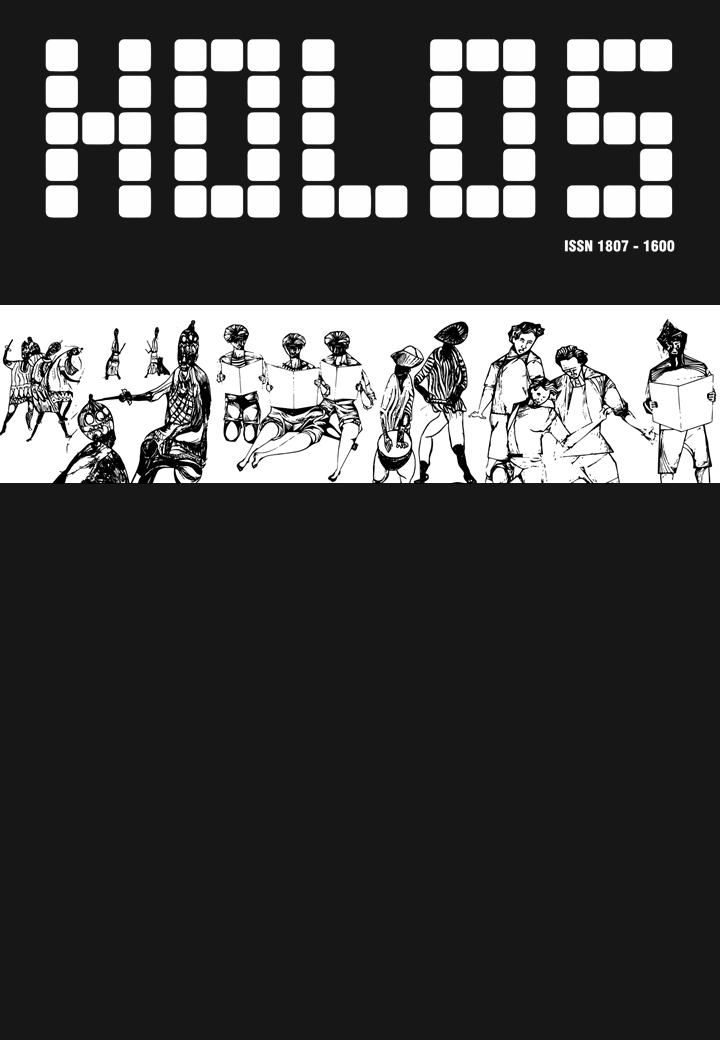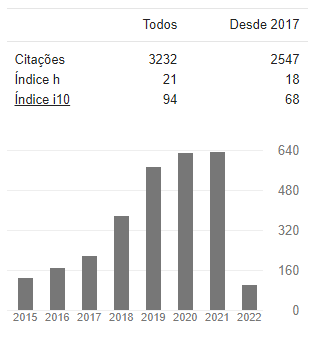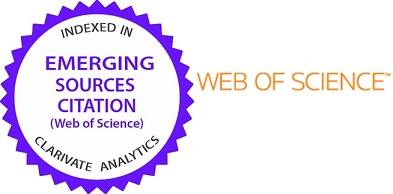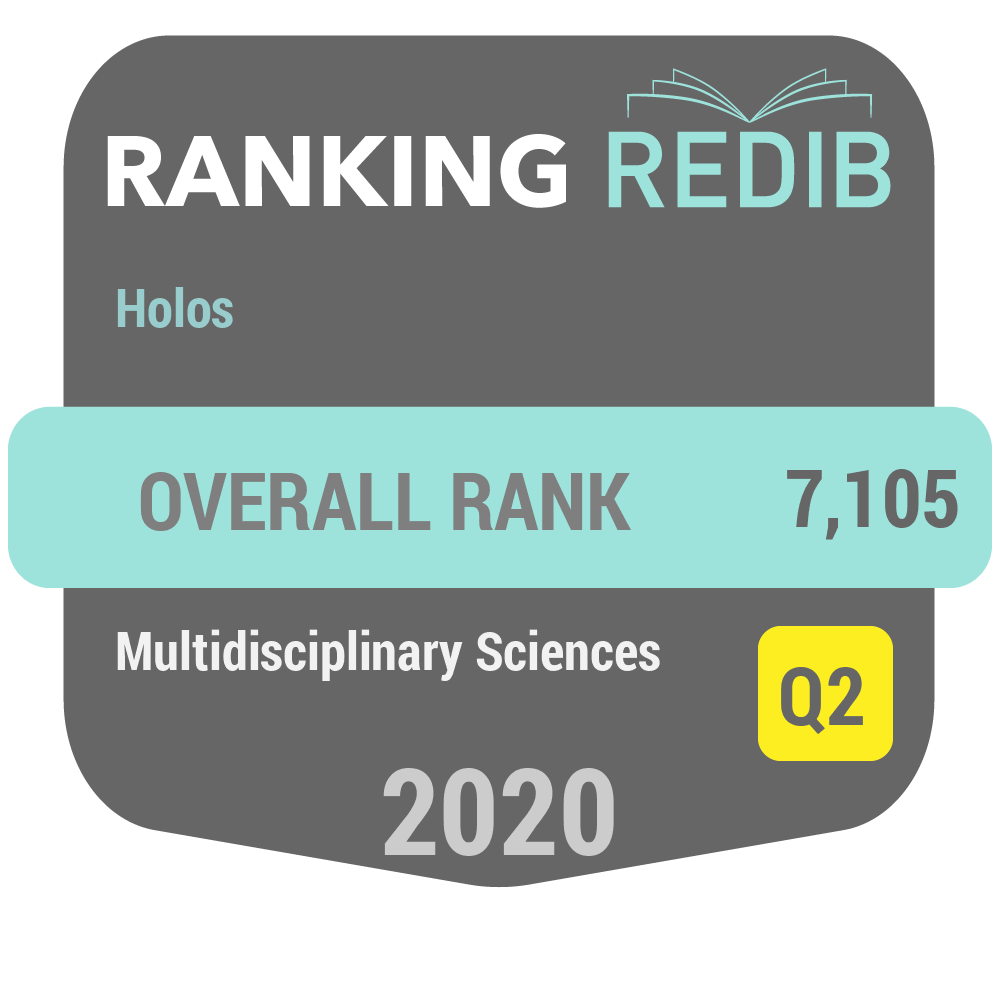O FUTURO PROFISSIONAL SOCIALMENTE RESPONSÁVEL: UNIVERSIDADE DE GUANAJUATO
DOI:
https://doi.org/10.15628/holos.2015.2830Palavras-chave:
RSE, responsabilidade social universitária, México, programas educativos, universidadesResumo
O objetivo deste trabalho é explorar o conhecimento e as convergências perceptuais que existem entre estudantes e coordenadores de cursos, de diversos programas educativos do Campus Guanajuato da Universidade de Guanajuato (México) com relação à Responsabilidade Social Empresarial (RSE) e a Responsabilidade Social Universitária (RSU). O presente estudo é de tipo qualitativo, empregaram-se grupos focados com os estudantes e entrevistas em profundidade com os coordenadores.
Os principais resultados deste estudo refletem que estudantes e coordenadores têm conhecimento sobre os conceitos de RSE e RSU, simultaneamente que identificam ações relacionadas em diversos contextos, principalmente com a orientação para temas de meio ambiente e ações sociais. Assim mesmo, são capazes de identificar atividades voluntárias e obrigatórias que poderiam ser consideradas no enquadramento da RSE, e atividades dependentes e independentes da universidade; bem como as principais motivações para adotá-las, relacionadas com benefícios tangíveis e intangíveis e com orientação para o gerenciamento. Entre os coordenadores se reconhece a importância da RSU e sua contribuição na formação dos estudantes. De modo geral, compartilha-se uma preocupação sobre a ética e se reconhece a necessidade de maior envolvimento e integração da RSU nas agendas dos tomadores de decisões institucionais.
Finalmente, mediante a análise interpretativa, geramos um modelo que adverte a existência duma concorrência de RSU, a mesma que foi desenvolvida em diferentes níveis entre os estudantes, com orientação tendencialmente para as preocupações meio ambientais e à sociedade.
Downloads
Referências
ADAMS, J. S., TASHCHIAN, A., & SHORE, T. H. Codes of Ethics as Signals for Ethical Behavior. Journal of Business Ethics, v.29, p. 199–211, 2001.
ASEMAH, E. S., OKPANACHI, R. A., & OLUMUJI, E. O. Universities and Corporate Social Responsibility Performance: An Implosion of the Reality. International Multidisciplinary Journal, v.7(4), p.195–224, 2013.
BECK, U. La Sociedad del riesgo: hacia una nueva modernidad. (J. NAVARRO, D. JIMÉNEZ, & M. R. BORRÁS, Trans.) Barcelona: Paidós, 2006, p.304.
BLIGH, D., THOMAS, H., & MCNAY, I. Understanding Higher Education: An Introduction for Parents, Staff, Employers and Students. Exeter: Intellect Books, 1999.
BOFF, L. El cuidado necesario. (M. J. GAVITO MILANO, Trans.). Madrid: Editorial Trotta, 2012.
BOWEN, H. R. Social Responsibilities of the Businessman. New York: Harper & Row, 1953.
CAREW, A. L., & MITCHELL, C. A. Characterizing undergraduate engineering students’ understanding of sustainability. European journal of engineering education, v.27(4), p.349–361, 2002.
CARROLL, A. B. A Three-Dimensional Conceptual Model of Corporate Performance. Academy of Management Review, v.4(4), p.497–505, 1979.
CARROLL, A. B. Corporate Social Responsibility: Evolution of a Definitional Construct. Business & Society, v.38(3), p. 268–295, 1999.
CASTELLS, M., & CARDOSO, G. A Sociedade em Rede. In A Sociedade em Rede. Do Conhecimento à Acção Política. Lisboa: Imprensa Nacional - Casa da Moeda, , 2005.
CASTELO, M., & LIMA, L. . Positioning Stakeholder Theory within the Debate on Corporate Social Responsibility. EJBO - Electronic Journal of Business Ethics and Organization Studies, v. 12(1), p. 5–15, 2007.
CHRISTENSEN, P., THRANE, M., JØRGENSEN, T. H., & LEHMANN, M. Sustainable development: Assessing the gap between preaching and practice at Aalborg University. International Journal of Sustainability in Higher Education, v. 10(1), p. 4–20, 2009.
CICS/UNESCO. Informe Mundial sobre Ciencias Sociales 2013 - Cambios ambientales globales. París: Ediciones OCDE y Ediciones UNESCO, 2013.
CLARKSON, M. B. E. A Stakeholder Framework for Analyzing and Evaluating Corporate Social Performance. The Academy of Management Review, v. 20(1), p. 92, 1995.
COHEN, D. Desafíos de la Responsabilidad Social Universitaria. Razón Y Palabra, v. 12(55), 2007.
COMISIÓN EUROPEA. Estrategia renovada de la UE para 2011-2014 sobre la responsabilidad social de las empresas. Bruselas: Comisión Europea. Disponível em: 2011 http://eur-lex.europa.eu/LexUriServ/LexUriServ.do?uri=COM:2011:0681:FIN:ES:PDF
CORBETTA, P. Metodología y técnicas de investigación social. Madrid: McGraw-Hill, 2007.
COTTON, D., BAILEY, I., WARREN, M., & BISSELL, S. Revolutions and second-best solutions: education for sustainable development in higher education. Studies in Higher Education, v. 34(7), p. 719–733, 2009.
CROFT, S., & DALTON, J. Corporate social responsibility (CSR) and ethics. In: Managing Corporate Reputation. Thorogood Publishing Ltd, 2003, p. 129–149.
CROWTHER, D., & ARAS, G. Corporate social responsibility. Ventus Publishing ApS. 2008. Disponível em: http://bookboon.com/es/defining-corporate-social-responsibility-ebook
DAVIS, K. Can Business Afford to Ignore Social Responsibilities? California Management Review, v. 2(3), p. 70–76, 1960.
DE LA CALLE, C., & GIMÉNEZ, P. Aproximación al concepto de Responsabilidad Social del Universitario. Comunicación Y Hombre, v. 7, p. 237–247, 2011.
DE VERE, I., MELLES, G., & KAPOOR, A. An ethical stance: Engineering curricula designed for social responsibility. In: S. J. CULLEY, B. J. HICKS, T. C. MCALOONE, T. J. HOWARD, & B. ION (Eds.), Proceedings of the 18th International Conference on Engineering Design (ICED11). Technical University of Denmark, 2011., v. 8, p. 216-225.
DOCHERTY, P., KIRA, M., & SHANI, A. B. Organizational development for social sustainability in work systems. Research in Organizational Change and Developmen, V. 17, p. 77–144, 2011.
DOMINGUES, I., & VELOSO DA VEIGA, C. Responsabilidade social na Universidade: missão e governação. In: I. DOMINGUES & P. REMOALDO (Eds.), Responsabilidade Social Organizacional. Desenvolvimento e Sustentabilidade. Famalição: Edições Húmus, 2012, p. 115–129.
ERWIN, P. M. Corporate Codes of Conduct: The Effects of Code Content and Quality on Ethical Performance. Journal of Business Ethics, v. 99(4), p. 535–548, 2010.
ADAMS, J. S., TASHCHIAN, A., & SHORE, T. H. Codes of Ethics as Signals for Ethical Behavior. Journal of Business Ethics, v.29, p. 199–211, 2001.
ASEMAH, E. S., OKPANACHI, R. A., & OLUMUJI, E. O. Universities and Corporate Social Responsibility Performance: An Implosion of the Reality. International Multidisciplinary Journal, v.7(4), p.195–224, 2013.
BECK, U. La Sociedad del riesgo: hacia una nueva modernidad. (J. NAVARRO, D. JIMÉNEZ, & M. R. BORRÁS, Trans.) Barcelona: Paidós, 2006, p.304.
BLIGH, D., THOMAS, H., & MCNAY, I. Understanding Higher Education: An Introduction for Parents, Staff, Employers and Students. Exeter: Intellect Books, 1999.
BOFF, L. El cuidado necesario. (M. J. GAVITO MILANO, Trans.). Madrid: Editorial Trotta, 2012.
BOWEN, H. R. Social Responsibilities of the Businessman. New York: Harper & Row, 1953.
CAREW, A. L., & MITCHELL, C. A. Characterizing undergraduate engineering students’ understanding of sustainability. European journal of engineering education, v.27(4), p.349–361, 2002.
CARROLL, A. B. A Three-Dimensional Conceptual Model of Corporate Performance. Academy of Management Review, v.4(4), p.497–505, 1979.
CARROLL, A. B. Corporate Social Responsibility: Evolution of a Definitional Construct. Business & Society, v.38(3), p. 268–295, 1999.
CASTELLS, M., & CARDOSO, G. A Sociedade em Rede. In A Sociedade em Rede. Do Conhecimento à Acção Política. Lisboa: Imprensa Nacional - Casa da Moeda, , 2005.
CASTELO, M., & LIMA, L. . Positioning Stakeholder Theory within the Debate on Corporate Social Responsibility. EJBO - Electronic Journal of Business Ethics and Organization Studies, v. 12(1), p. 5–15, 2007.
CHRISTENSEN, P., THRANE, M., JØRGENSEN, T. H., & LEHMANN, M. Sustainable development: Assessing the gap between preaching and practice at Aalborg University. International Journal of Sustainability in Higher Education, v. 10(1), p. 4–20, 2009.
CICS/UNESCO. Informe Mundial sobre Ciencias Sociales 2013 - Cambios ambientales globales. París: Ediciones OCDE y Ediciones UNESCO, 2013.
CLARKSON, M. B. E. A Stakeholder Framework for Analyzing and Evaluating Corporate Social Performance. The Academy of Management Review, v. 20(1), p. 92, 1995.
COHEN, D. Desafíos de la Responsabilidad Social Universitaria. Razón Y Palabra, v. 12(55), 2007.
COMISIÓN EUROPEA. Estrategia renovada de la UE para 2011-2014 sobre la responsabilidad social de las empresas. Bruselas: Comisión Europea. Disponível em: 2011 http://eur-lex.europa.eu/LexUriServ/LexUriServ.do?uri=COM:2011:0681:FIN:ES:PDF
CORBETTA, P. Metodología y técnicas de investigación social. Madrid: McGraw-Hill, 2007.
COTTON, D., BAILEY, I., WARREN, M., & BISSELL, S. Revolutions and second-best solutions: education for sustainable development in higher education. Studies in Higher Education, v. 34(7), p. 719–733, 2009.
CROFT, S., & DALTON, J. Corporate social responsibility (CSR) and ethics. In: Managing Corporate Reputation. Thorogood Publishing Ltd, 2003, p. 129–149.
CROWTHER, D., & ARAS, G. Corporate social responsibility. Ventus Publishing ApS. 2008. Disponível em: http://bookboon.com/es/defining-corporate-social-responsibility-ebook
DAVIS, K. Can Business Afford to Ignore Social Responsibilities? California Management Review, v. 2(3), p. 70–76, 1960.
DE LA CALLE, C., & GIMÉNEZ, P. Aproximación al concepto de Responsabilidad Social del Universitario. Comunicación Y Hombre, v. 7, p. 237–247, 2011.
DE VERE, I., MELLES, G., & KAPOOR, A. An ethical stance: Engineering curricula designed for social responsibility. In: S. J. CULLEY, B. J. HICKS, T. C. MCALOONE, T. J. HOWARD, & B. ION (Eds.), Proceedings of the 18th International Conference on Engineering Design (ICED11). Technical University of Denmark, 2011., v. 8, p. 216-225.
DOCHERTY, P., KIRA, M., & SHANI, A. B. Organizational development for social sustainability in work systems. Research in Organizational Change and Developmen, V. 17, p. 77–144, 2011.
DOMINGUES, I., & VELOSO DA VEIGA, C. Responsabilidade social na Universidade: missão e governação. In: I. DOMINGUES & P. REMOALDO (Eds.), Responsabilidade Social Organizacional. Desenvolvimento e Sustentabilidade. Famalição: Edições Húmus, 2012, p. 115–129.
ERWIN, P. M. Corporate Codes of Conduct: The Effects of Code Content and Quality on Ethical Performance. Journal of Business Ethics, v. 99(4), p. 535–548, 2010.
FORO DE CONSEJOS SOCIALES DE LAS UNIVERSIDADES PÚBLICAS DE ANDALUCÍA. Memoria de Responsabilidad Social de las Universidades Andaluzas, 2009. Disponível em: http://rsuniversitaria.org/web/images/stories/librocompleto.pdf
FREDERICK, W. C. From CSR1 to CSR2: The Maturing of Business-and-Society Thought. Business & Society, v. 33(2), p. 150–164, 1994.
FREEMAN, R. E. Strategic Management: A Stakeholder Approach. Marshfield, MA: Harpercollins College Div, 1984.
GASCA-PLIEGO, E., & OLVERA-GARCÍA, J. Construir ciudadanía desde las universidades, responsabilidad social universitaria y desafíos ante el siglo XXI. Convergencia: Revista de Ciencias Sociales, v. 18(56), p. 37–58, 2011.
HEMPHILL, T. A. Corporate citizenship: the case for a new corporate governance model. Business and Society Review, v. 109(3), p. 339–361, 2004.
HOLMBERG, J., SVANSTRÖM, M., PEET, D.-J., MULDER, K., FERRER-BALAS, D., & SEGALÀS, J.. Embedding sustainability in higher education through interaction with lecturers: Case studies from three European technical universities. European Journal of Engineering Education, v. 33(3), p. 271–282, 2008.
IESALC-UNESCO. La educación superior en América Latina y el Caribe: diez años después de la Conferencia Mundial de 1998. (C. TÜNNERMANN BERNHEIM, Ed.). Cali: Iesalc-Unesco, 2008.
JACOBI, P. Educação ambiental, cidadania e sustentabilidade. Cadernos de Pesquisa, n. 118, p. 189–206, 2003.
JONES, M. T. The Institutional Determinants of Social Responsibility. Journal of Business Ethics, v. 20(2), p. 163–179, 1999.
JUNYENT, M., & DE CIURANA, A. M. G. Education for sustainability in university studies: a model for reorienting the curriculum. British Educational Research Journal, V. 34(6), P. 763–782, 2008.
KANTANEN, H. Civic Mission and Social Responsibility. Higher Education Management and Policy, V. 17(1), P. 107–122, 2005.
KLIKSBERG, B., FERNÁNDEZ DE COLOMBO, M. I., CRUZ DE URIOSTE VIDAURRE, M., GUTIÉRREZ MONROY, R. E., SOLANO SALINAS, R., ANTILLÓN MORALES, R. F., & DE LA LUZ LANZAGORTA, M. DEL C. Responsabilidad Social de las Universidades (1st ed.) Buenos Aires: Red Latinoamericana de Cooperación Universitaria, 2010.
KRIZEK, K. J., NEWPORT, D., WHITE, J., & TOWNSEND, A. R. Higher education’s sustainability imperative: how to practically respond?. International Journal of Sustainability in Higher Education, v. 13(1), p. 19–33, 2012.
LANTOS, G. P. The boundaries of strategic corporate social responsibility. Journal of Consumer Marketing, v. 18(7), p. 595–632, 2001.
LANTOS, G. P. The ethicality of altruistic corporate social responsibility. Journal of Consumer Marketing, v. 19(3), p. 205–232, 2002.
LAPPALAINEN, P. Development cooperation as methodology for teaching social responsibility to engineers. 2011. European Journal of Engineering Education, v. 36(6), p. 513–519, 2011.
LOACKER, B., & MUHR, S. L. How Can I Become a Responsible Subject? Towards a Practice-Based Ethics of Responsiveness. Journal of Business Ethics, v. 90(2), p. 265–277, 2009.
LÓPEZ, R., GIL-ANTÓN, M., JAIMES-FIGUEROA, E., MENDOZA-ROJAS, J., PALLÁN-FIGUEROA, C., PÉREZ-GARCÍA, M. J., RODRÍGUEZ-GÓMEZ, R. Inclusión con responsabilidad social. Una nueva generación de políticas de educación superior. México, DF: ANUIES, 2012.
MCKENZIE, S. Social sustainability: towards some definitions. (K. LEESON, Ed.) Hawke Research Institute Working Paper Series (pp. 1–29). Magill, South Australia, 2004, n. 27.
NEWTON, W. Qualitative Data, Analysis, and Design. In: Introduction to Educational Research. A Critical Thinking Approach (2nd ed.). Los Angeles: SAGE Publications, Inc, 2012, p. 342–386.
OECD/CEDEFOP. Greener Skills and Jobs. OECD Publishing, 2014.
OIT. La igualdad en el trabajo: afrontar los retos que se plantean. Ginebra, 2007. Disponivél em: http://www.ilo.org/wcmsp5/groups/public/@dgreports/@dcomm/@webdev/documents/publication/wcms_082609.pdf
ONU. El Futuro que Queremos para Todos. Nueva York: Organización de las Naciones Unidas, 2012a. Disponível em: http://www.un.org/en/development/desa/policy/untaskteam_undf/unttreport_sp.pdf
ONU. Resolución aprobada por la Asamblea General. El futuro que queremos. Organización de las Naciones Unidas, 212b. Disponível em: http://www.un.org/ga/search/view_doc.asp?symbol=A/RES/66/288&Lang=S
OSLER, A., & STARKEY, H. Changing Citizenship: Democracy and Inclusion in Education. Glasgow: Open University Press, 2005, p. 229.
REMOLINA, G. La responsabilidad social de la universidad. Nómadas, n. 19, p. 239–246, 2003.
ROHWEDER, L. Integrating Environmental Education Into Business Schools’ Educational Plans in Finland. GeoJournal, v. 60(2), p. 175–181, 2004.
RUIZ, J. I. Metodología de la investigación cualitativa. Bilbao: Universidad de Deusto, 2012.
SAMMALISTO, K., & LINDHQVIST, T. Integration of Sustainability in Higher Education: A Study with International Perspectives. Innovative Higher Education, v. 32(4), p. 221–233, 2007.
SÁNCHEZ-FERNÁNDEZ, M. D. La responsabilidad social organizativa: stakeholders futuros directivos. Revista Internacional Administración & Finanzas, v. 4(4), p. 87–102, 2011.
SÁNCHEZ-FERNÁNDEZ, M. D., HATTUM-JANSSEN, N. VAN, CAIRES, S., TEIXEIRA, L., IBARRA-TORRES, K., & LÓPEZ-PORTILLO, H. Responsabilidade social nos cursos de engenharia e artes: perspectivas compradas entre alunos e diretores de curso. 2012. In Responsabilidade Social na bovernamentação, nas empresas e nas organizações não empresariais: do diagnóstico à ação. Coimbra: ALMEDINA.
SANTOS, D. Responsabilidade social, desenvolvimento sustentável e território: que relação?. In: I. DOMINGUES & P. REMOALDO (Eds.), Responsabilidade Social Organizacional. Desenvolvimento e Sustentabilidade. Famalição: Edições Húmus, 2012, p. 81–92.
SAVATER, F.. El valor de educar. México, DF: Instituto de estudios educativos y sindicales de América, 1997.
SELEKMAN, B. M. Businessmen in power. Harvard Business Review, v. 39(5), p. 95–110, 1961.
SETHI, S. P. Dimensions of Corporate Social Performance: An Analytical Framework. California Management Review, v. 17(3), p. 58–64, 1975.
SINGER, A. E. Strategy as moral philosophy. Strategic Management Journal, v. 15(3), p. 191–213, 1994.
TRBUSIC, H. Engineering in the Community: Critical Consciousness and Engineering Education. 2014. Interdisciplinary Description of Complex Systems, v. 12(2), p. 108–118, 2014.
UNESCO. Decenio de las Naciones Unidas de la Educación para el Desarrollo Sostenible, 2005-2014: el Decenio en pocas palabras. París: UNESCO, 2005.
UNESCO. Conferencia Mundial sobre la Educación Superior - 2009: La nueva dinámica de la educación superior y la investigación para el cambio social y el desarrollo. París: UNESCO, 2009.
UNESCO, & BINDÉ, J. Hacia las sociedades del conocimiento. París: UNESCO, 2005.
UNESCO, DELORS, J., AL MUFTI, I., AMAGI, I., CARNEIRO, R., CHUNG, F., NANZHAO, Z. La educación encierra un tesoro. Informe a la UNESCO de la Comisión Internacional sobre la Educación para el Siglo XXI. Madrid: Santillana-UNESCO, 1996.
UNESCO, & MORIN, E. Los siete saberes necesarios para la educación del futuro. (M. VALLEJO-GÓMEZ, N. VALLEJO-GÓMEZ, & F. GIRARD, Trans.). París: Organización de las Naciones Unidas para la Educación, la Ciencia y la Cultura,1999.
UNIVERSIDAD DE GUANAJUATO. Capítulo 1. Fundación del Campus, 2009. Disponível em: http://www.ugto.mx/campusgto/informe1/informe/CapituloPrimero.pdf
UNIVERSIDAD DE GUANAJUATO. Modelo Educativo de la Universidad de Guanajuato. Guanajuato: Universidad de Guanajuato, 2011. Disponível em: http://www.ugto.mx/pladi/pdf/modelo-educativo-ug.pdf
VALLAEYS, F. Breve marco teórico de responsabilidad social universitaria. 2006. Disponível em: http://rsuniversitaria.org/web/images/stories/BreveMarcoTeodelaResponsabilidadSocialUniv.pdf
WARHURST, A. Corporate citizenship and corporate social investment. Journal of Corporate Citizenship, v. 1, p. 57–73, 2001.
WELLINGTON, J. Science Education for Citizenship and a Sustainable Future. Pastoral Care in Education, v.21(3), p.13–18, 2003.
WOOD, D. J. Corporate Social Performance Revisited. Academy of Management Review, v. 16(4), p. 691–718, 1991.
WRIGHT, T. The Evolution of Sustainability Declarations in Higher Education. In: P. B. CORCORAN & A. E. J. WALS (Eds.), Higher Education and the Challenge of Sustainability: Problematics, Promise and Practice. Netherlands: Springer Netherlands, 2004, p. 7-19.









































